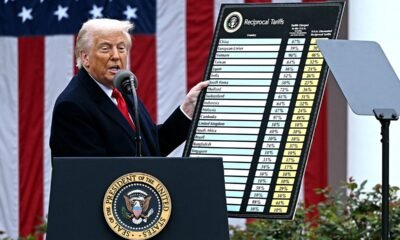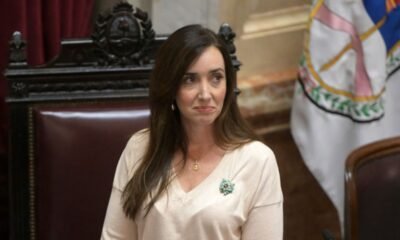INTERNACIONAL
How Donald Trump tried to court the Atlantic – and why the liberal magazine landed an interview

Hell hath frozen over: At the White House the other day, Donald Trump «was launching a charm offensive, directed mainly at Goldberg,» as in Jeffrey Goldberg, the Atlantic’s editor-in-chief. «There was none of the name-calling or hostility he regularly levels at our magazine.»
That’s according to Atlantic reporters Ashley Parker and Michael Scherer, who wrote the magazine’s cover story, which was posted yesterday.
For all the insights gleaned from the interview, nothing is more fascinating than how it came about.
They called the president on his cell phone. (Wha? Who do I have to court to get that? The reporters ain’t saying.)
Trump says he did the initial phone interview to see if the liberal magazine could be fair.
PRESIDENT TRUMP TELLS THE ATLANTIC HE RUNS THE COUNTRY ‘AND THE WORLD’
So I’m here to pronounce that the entire, seemingly endless piece is fair. The president hasn’t taken a shot at it on Truth Social, at least so far.
He has, however, ripped new polls from the «Failing New York Times» and «ABC/Washington Post» as «FAKE POLLS FROM FAKE NEWS ORGANIZATIONS,» saying they should be «investigated for ELECTION FRAUD, and add in the Fox News Pollster while you’re at it.» His lowest approval rating, in the Post-ABC survey, was 39 percent.
Meanwhile, we may now look back on Trump’s 2024 victory as inevitable, but after Jan. 6 it was anything but. On the cell call, «The president seemed exhilarated by everything he had managed to do in the first two months of his second term.»
President Trump recently gave an interview to The Atlantic. (BRENDAN SMIALOWSKI/AFP via Getty Images)
And then came the transaction: «As ever, Trump was on the hunt for a deal. If he liked the story we wrote, he said, he might even speak with us again.»
Goldberg describes the session: «What I found in this particular meeting was a Trump who was low-key, attentive, and eager to convince us that he is good at his job and good for the country. It isn’t easy to escape the tractor beam of his charisma, but somehow we managed, and we asked him what needed to be asked.
«But squaring Trump the Charmer with the Orcish Trump we more frequently see is difficult…Trump posted on the social-media platform he owns that Ashley is a ‘Radical Left Lunatic’ (she is not) and that Michael ‘has never written a fair story about me, only negative, and virtually always LIES’ (also false). It is our task at the Atlantic not to be bullied by these sorts of attacks.»
STATE OF WAR: HOW TRUMP IS FIGHTING A 9-FRONT BATTLE
The most interesting Trump sound bite is his comparison of the two terms:
«The first time, I had two things to do—run the country and survive; I had all these crooked guys. And the second time, I run the country and the world.»
Parker and Scherer did many other interviews, such as with Steve Bannon. «Our reality is that we won,» and he cited the conspiracy theory that the FBI had incited the crowd on Jan. 6. The reporters said that was simply untrue.
«Now, here’s the interesting thing,» Bannon said. «Who’s won that argument? I think we have…
«This time it’s ‘Hey, f**k you, Greenland’s ours…When you’ve come back from such long odds, you clearly feel, ‘I can do anything.’ »
What about the four criminal investigations, including the conviction on the weakest one – Alvin Bragg’s hush money case? Trump says his numbers kept going up.
INTERVIEWING DONALD TRUMP: A LAST-MINUTE BLITZ AND NEW CLOSING MESSAGE
«Shockingly, yes,» Trump said. «Normally, it would knock you out. You wouldn’t even live for the next day. You know, you’d announce your resignation, and you’d go back and ‘fight for your name,’ like everybody says—you know, ‘fight for your name, go back to your family.’ …Yeah, it made me stronger, made me a lot stronger.»
He also said in the phone interview: «I got indicted five different times by five different scumbags, and they’re all looking for jobs now, so it’s one of those things. Who would have thought, right? It’s been pretty amazing.»
After the 2016 election, Trump told oil executives at Mar-a-Lago:
If I’m not president, you’re f***ed. Look at your profit-and-loss statements. You realize what would have happened to you if she was president? What’s wrong with you?») She was Kamala Harris, of course.
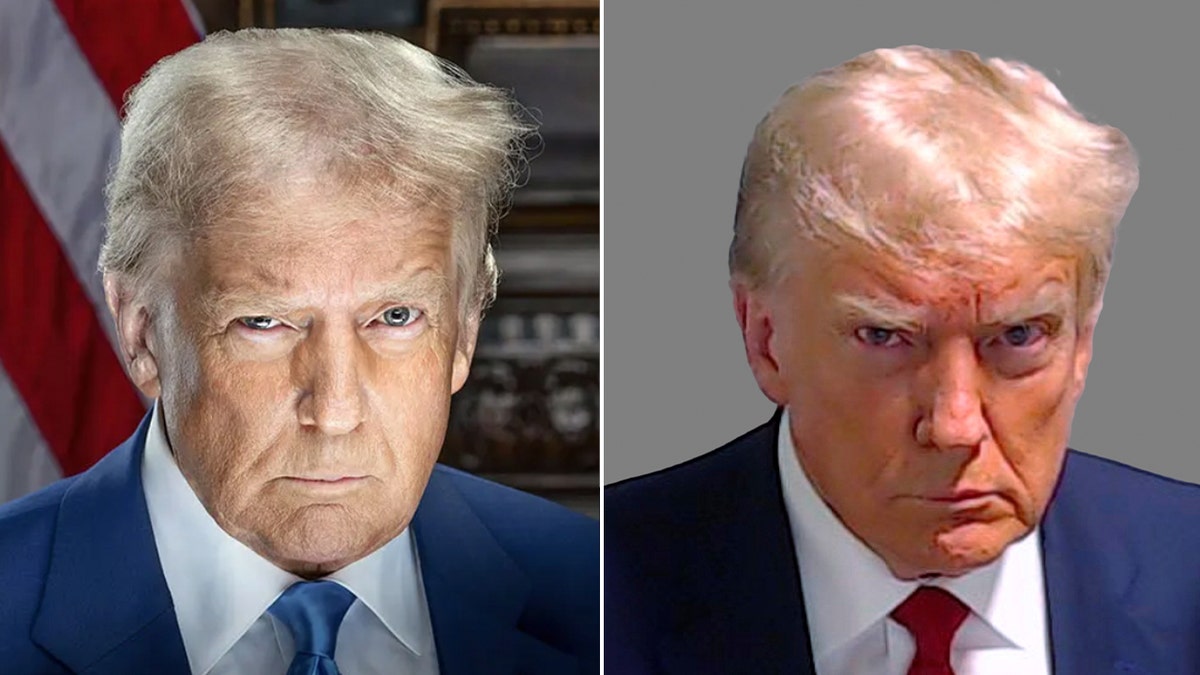
Referring to the criminal cases against him – including the charges brought forth by Manhattan District Attorney Alvin Bragg, Trump said «it made [him] stronger.» (Fulton County Sheriff’s Office via AP / Trump-Vance Transition Team)
One turning point: When he went to East Palestine, Ohio after the derailment of a train carrying toxic chemicals, while Joe Biden didn’t do squat.
On the Kennedy Center: «I didn’t really get to go the first time, because I was always getting impeached or some bulls**t, and I could never enjoy a show.» So he fired the Democrats and made himself chairman.
All right, enough quotes. Wait, one more that captures the tone of the piece:
«I got 38 percent of the male Black vote. Nobody knew that was possible. That’s a lot. I got 56 percent of Hispanics. How about that one? Every county along the Texas border is Hispanic. I won every one of them.» Though every single number he cited was wrong, the general thrust of his observation was correct.»
The reporters chronicled how things have gone south for the president, especially on tariffs and the economy, and how he pressured Hill Republicans into backing his nominees with primary threats.
SUBSCRIBE TO HOWIE’S MEDIA BUZZMETER PODCAST, A RIFF ON THE DAY’S HOTTEST STORIES
After the March phone interview, the reporters tried Trump’s cellphone again. Just got voice mail. But at 1:38 am, he tried them back. No message.
Trump believes he can win over even his worst enemies. In 2015 or 2016, I watched him make a beeline in the New York green room for Karl Rove, who was very rough on him. At worst, he thinks, he can neutralize the person. Or soften him or her up for the next time. He enjoys the challenge.
The mainstream media almost uniformly can’t stand Donald Trump. He does invite some of his own negative headlines, while providing unprecedented access, but much of the press is back in Resistance mode.
CLICK HERE TO GET THE FOX NEWS APP
Still, the Atlantic’s original pitch is undeniable, that he’s «The Most Consequential President of the 21st Century.»
Media Buzz,Donald Trump,Media
INTERNACIONAL
Millions lose power across Cuba as Trump sanctions continue to fuel ongoing energy crisis

NEWYou can now listen to Fox News articles!
A large-scale blackout struck western Cuba on Wednesday, leaving millions without power in the latest outage to hit the island as it grapples with dwindling oil supplies due to sanctions imposed by President Donald Trump.
The U.S. Embassy in Cuba said that at approximately 12:41 p.m., there was a «disconnection of the national electrical grid resulting in a complete power outage» stretching from Camagüey to Pinar del Río, including the greater Havana metropolitan area.
«Cuba’s national electrical grid is increasingly unstable and prolonged scheduled and unscheduled power outages are a daily occurrence across the country to include Havana,» the embassy said.
«Outages affect water supply, lighting, refrigeration, and communications. Take precautions by conserving fuel, water, food, and mobile phone charge, and be prepared for significant disruption.»
Neya Perez, 86, paints the nails of her neighbor Reyna Maria Rodriguez, 77, during a mass blackout across most of the country, in Havana, Cuba, on March 4, 2026. (REUTERS/Norlys Perez)
The incident was reportedly caused by an unexpected shutdown of the Antonio Guiteras thermoelectric plant, located roughly 62 miles east of Havana.
Local reports indicate the island may need at least three days to restore operations, according to the Associated Press.
Vicente de la O Levy, the minister of Energy and Mines of Cuba, added that «We are working on the restoration of the SEN amid a complex energy situation.»
At least one power plant, Felton 1, remains online, he said.
CUBA’S PRESIDENT DEFIANT, SAYS NO NEGOTIATIONS SCHEDULED AS TRUMP MOVES TO CHOKE OFF OIL LIFELINE
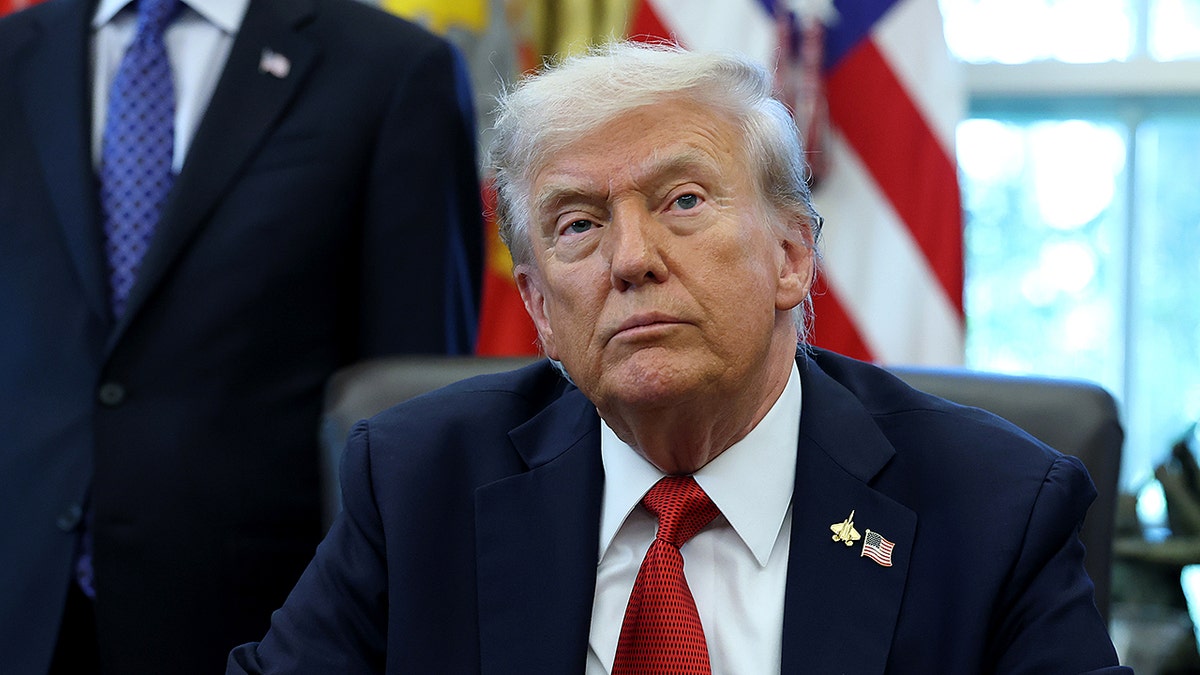
President Donald Trump speaks in the Oval Office at the White House on Oct. 6, 2025 in Washington, D.C. (Anna Moneymaker/Getty Images)
Reuters reported that, because Cuba is accustomed to frequent power outages caused by state-imposed energy rationing, some traffic lights and businesses remained operational thanks to solar panels or backup generators. Many residents have also installed solar panels on their homes and vehicles to maintain electricity amid soaring fuel prices, the outlet said.
Cuba has endured a string of widespread blackouts in recent years due to long-standing issues with its aging power infrastructure and chronic fuel shortages.
However, the situation worsened in January after a U.S. military operation captured Venezuelan President Nicolás Maduro and halted Venezuelan oil exports, effectively choking off Cuba’s key source of fuel.
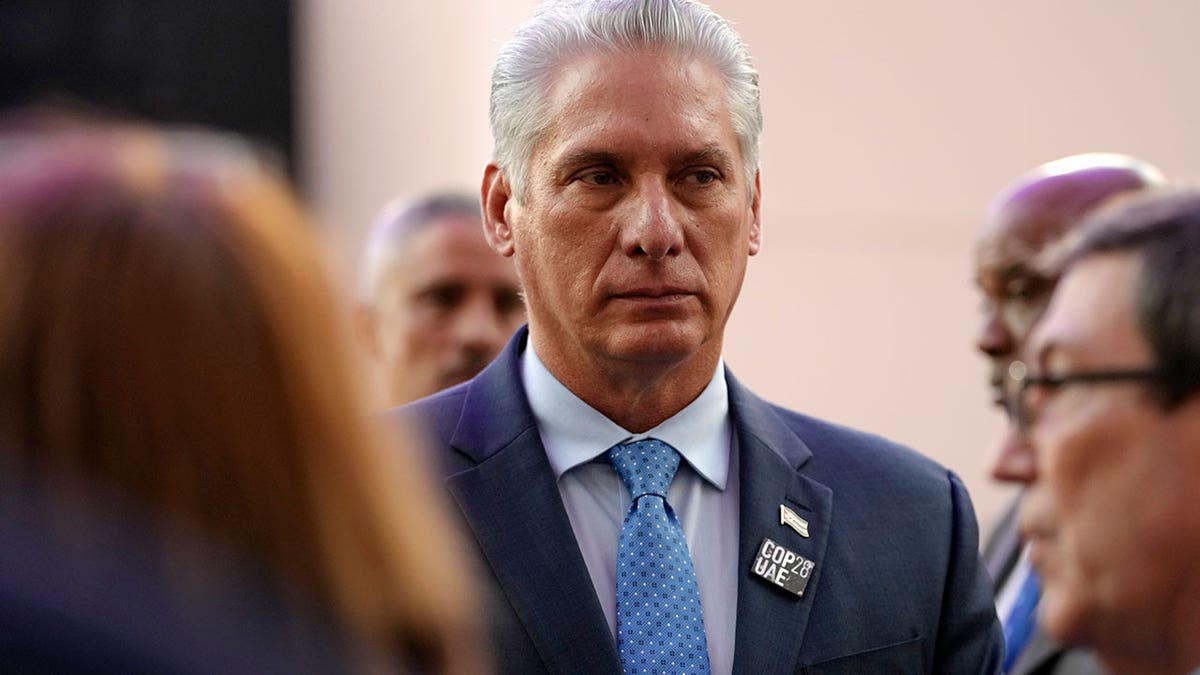
FILE – Cuba President Miguel Diaz-Canel walks through the COP28 U.N. Climate Summit, Saturday, Dec. 2, 2023, in Dubai, United Arab Emirates. (AP Photo/Peter Dejong, File)
CLICK HERE TO DOWNLOAD THE FOX NEWS APP
Cuban President Miguel Díaz-Canel stated in January that, despite the U.S. severing Havana’s energy lifeline, his administration would not negotiate with Washington to establish a new agreement.
Reuters contributed to this report.
cuba,donald trump,venezuelan political crisis,energy
INTERNACIONAL
GOP senators tangle with Noem during heated hearing on her handling of deportation surge
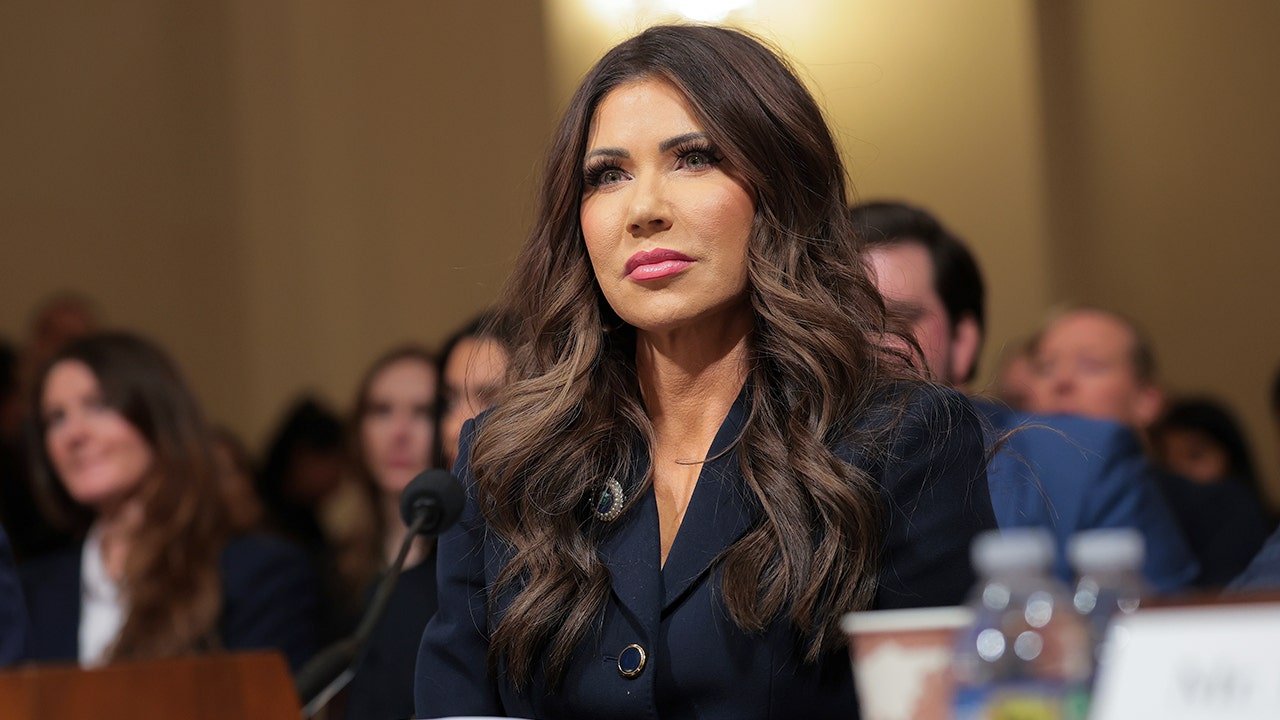
NEWYou can now listen to Fox News articles!
Department of Homeland Secretary Kristi Noem faced heat from Republican senators during a hearing before the Senate Judiciary Committee Tuesday, including criticism about her leadership during the Trump administration’s deportation surge.
One GOP senator compared her past animal killings to decisions she has made as DHS secretary.
Outgoing Sen. Thom Tillis, R-N.C., and Sen. John Kennedy, R-La., both got into testy exchanges with Noem Tuesday during a Department of Homeland Security (DHS) oversight hearing with lawmakers.
Tillis likened Noem’s decisions as a farmer and dog owner to what he described as Noem’s disastrous leadership amid Trump’s border crackdown.
Kennedy got into a back-and-forth with Noem over her decision to describe Renee Good and Alex Pretti as domestic terrorists in the early days after they were killed and her subsequent reasoning for doing so.
«Those are bad decisions made in the heat of the moment. Not unlike what happened up in Minneapolis,» Tillis said, comparing Noem’s time as an animal owner to her leadership as Secretary of DHS.
Department of Homeland Security Secretary Kristi Noem is sworn in before she testifies during a Senate Judiciary Committee oversight hearing on Capitol Hill in Washington Tuesday, March 3, 2026. (AP Photo/Manuel Balce Ceneta)
Noem came under fire in the Spring of 2024 when reporting based on an advanced copy of her memoir, «No Going Back,» described an incident of her killing her family dog Cricket and a separate incident during which she killed a goat. Noem explained that the dog had proven itself «untrainable» after several violent attacks and described the decision to eventually shoot the dog.
«I hated that dog,» Noem recalled, according to The Guardian and other media reports that covered the pre-released copy of Noem’s book at the time. «[Cricket was] dangerous to anyone she came in contact with.
«It was not a pleasant job,» Noem added, «but it had to be done. And after it was over, I realized another unpleasant job needed to be done.» Noem then went on to describe slaughtering the goat that she described as «nasty and mean,» adding it smelled «disgusting, musky, rancid» and complained that it «loved to chase» her children.
The reporting on Noem’s memoir prompted a group of lawmakers on Capitol Hill to start a Dog Lovers Caucus, and Noem’s memoir excerpt led to criticism against her from animal rights groups and other critics.
«You decided to kill that dog because you would not invest in the appropriate time and training, and then you have the audacity to go into a book and say it’s a leadership lesson about tough choices. It’s in your book. We could play it if we had time,» Thillis said during his heated comments about Noem’s leadership, which also included criticism about her approach to the Federal Emergency Management Administration (FEMA).
«And you killed a goat because you said it was behaving badly. You are a farmer. You don’t castrate a goat. They behave badly. You should have probably done that before, but my point is, those are bad decisions made in the heat of the moment. Not unlike what happened up in Minneapolis.»

Kristi Noem participates in the South Dakota Buffalo Roundup in September 2023 (Fox News Digital )
In addition to getting hounded by Tillis, Noem also got into a testy exchange with GOP Sen. Kennedy, who signaled concern over who she was taking direction from during her tenure running DHS.
‘YOU SHOULD BE ASHAMED!’: PROTESTER DRAGGED FROM KRISTI NOEM’S SENATE HEARING
«At the time you said [what Renee Good and Alex Pretti engaged in] were acts of domestic terrorism,» Kennedy told Noem, who said that was the initial assessment of what the pair’s actions «appeared» to be. Noem attempted to interject that the assessment came at a time when there was a lot of information circulating about the Trump administration’s deportation efforts in Minneapolis, but Kennedy stood firm and continued with his line of questioning.
«As I’ve said previously in this hearing is that …,» Noem began before Kennedy cut her off.
«Did you say that? I think it’s been widely reported. Did you say that?» he asked.
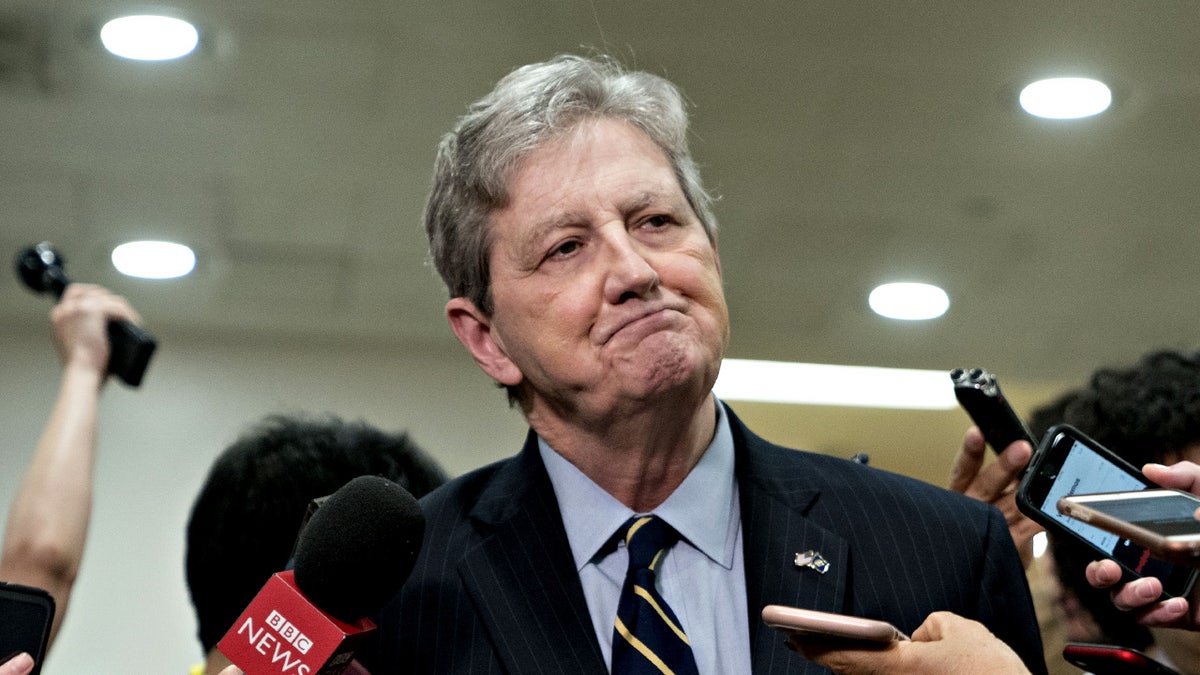
Sen. John Kennedy, R-La., pauses while speaking to members of the media on Capitol Hill. (Andrew Harrer/Bloomberg via Getty Images)
Noem continued to try and explain the reasoning for the domestic terrorism label,until Kennedy interjected.
«I think it’s safe to say you got some pushback on that,» Kennedy said, adding he did not want to make a judgment on the fairness of it but wanted to point it out.
«Yes,» Noem agreed, before Kennedy got to the root of his question.
«What got my attention was that you blamed those statements on Mr. Stephen Miller at the White House, did you not?» he asked.
Noem fervently denied the accusation, arguing the claim was from an anonymous source that could not be trusted.
«Where you’re seeing that is in a news article of anonymous sources, and anonymous sources say a lot of things, but I’ve never said that at all,» Noem claimed.
Kennedy shot back that she «said on the record» that «everything I’ve done, I’ve done at the direction of the president and Stephen.» Kennedy then provided an exact date on which Noem made the remark.
DEMOCRATS ACCUSE ICE OF TARGETING DREAMERS WHILE DHS HIGHLIGHTS GANG MEMBERS, CHILD RAPISTS ARRESTED THIS WEEK
«Do you think it was fair to blame Mr. Miller for your words?» Kennedy asked.
Noem dismissed the question again and continued to contest the legitimacy of the claim she made such statements, adding she «did not» blame Miller for her decision to call Good and Pretti domestic terrorists.
«You’re reading from a newspaper article with anonymous sources,» she said.
«Are you denying that you said that?» Kennedy asked.
«Sir, I am not going to speak to that situation that is relayed on anonymous sources,» Noem said again.

White House deputy chief of staff for policy Stephen Miller has offered to appear on CNN to discuss any topic. (Kevin Dietsch/Getty Images)
CLICK HERE TO DOWNLOAD THE FOX NEWS APP
The report in question was a January article from Axios, which wrote that the «episode illustrates the confusion that gripped the administration after the Saturday shooting death of Minnesota protester Alex Pretti. And it shows the influence of Miller, Trump’s close and longest-serving political adviser whose dominion in the White House far exceeds his title.»
«They’re quoting you on the record saying it’s Stephen’s fault,» Kennedy replied before the committee chairman gaveled that the senator’s time was up.
«Thank you,» Kennedy said before another senator began to speak.
Fox News Digital reached out to DHS for comment on the testy exchanges Noem had during the hearing Tuesday but did not receive a response in time for publication.
kristi noem,hearings,homeland security,immigration,deportation,republicans
INTERNACIONAL
Sonia Ruíz y el monstruoso costumbrismo que desafía al tiempo

Hay que vivir el presente. ¿Quién no oyó esta máxima con tufillo al viejo new age que se vende bajo la etiqueta de mindfullness?, ¿quién no vio, en algún reel, la importancia de habitar el hoy, de no pensar en el mañana, de dejar ir el pasado? Somos un instante y lo demás no importa nada.
Disfrazada detrás de algunos preceptos budista, este tipo de afirmación, de pensamiento, es desde hace un tiempo ya una commodity hecha bestseller, un subproducto que busca, a través de la soledad y la alienación, centrarse en el instante como experiencia vital.
Todo lo contrario es la obra de Sonia Ruíz (Bella Vista, Tucumán, 1984), quien en sus pinturas, que se presentan en Retratos, en galería Piedras, parece querer capturar, como en el filme dirigido por los Daniels, Todo en todas partes al mismo tiempo: somos presente, sí, pero también lo que fuimos, lo que seremos y, por qué no, una proyección, algo ilusorio, donde todo sucede en simultáneo.
Sus retratos ensayan una multiplicidad de perspectivas, a veces superpuestas en una sola imagen. Ruíz experimenta así con la combinación de diversas fotografías de una misma situación, componiendo escenas complejas.

“Cada parte de la foto me parece como que es rescatable. Entonces voy como juntándolas, haciendo una especie de collage”, dijo a Infobae Cultura, sobre el proceso que no es digital, sino manual, y alimenta el carácter fragmentario y múltiple de los cuadros.
Esta superposición de instantes, de momentos y miradas sobre el ser en la obra de Ruiz, generan, aún sin buscarlo, una mirada filosófica eternalista sobre la vida: el pasado, el presente y el futuro son igualmente reales y existen en simultáneo.
Pero, la artista no produce ese acercamiento desde una postura técnica-teórica, despojada de su propia identidad, sino a partir de las personas que la molderaron, su familia, generando así un vínculo profundo con los retratados que son, en varios sentidos, la propia Sonia.
En la obra teatral Los bienes visibles, con dramaturgia y dirección de Juan Pablo Gómez, de reciente paso por el CC Borges, uno de los personajes proclama que “dentro de una familia hay muchas familias”, enfatizando que la experiencia de cada individuo marca su mirada y que, de esa manera, cada uno tendría una opinión diferente sobre las relaciones. En las pinturas de Sonia Ruíz, sin dudas, pueden verse destellos de una narración personal: hay gestos protectores, de agobio, de curiosidad, de un amor a distancia y contemplativo.

Y es que lo íntimo nunca no deja de revelarse en la creación artística. En este caso, la pintora presenta a través de esa familia que quedó en su Bella Vista natal, de la que se marchó tras la pandemia, como lo cotidiano puede ser monstruoso y tierno, de apariencia sosegada e hiperquinético a la vez, como un átomo que vibra cada vez más impaciente a medida que el observador se acerca.
La serie, explica, comenzó en 2023 y estuvo inspirada por escenas de su infancia, pero evolucionó integrando nuevas perspectivas surgidas tras su mudanza a Buenos Aires y su paso por la Di Tella.
El traslado físico se tradujo, entonces, en un desplazamiento emocional: la memoria de su casa y las reuniones familiares se convirtieron en material pictórico donde la representación del padre, la hermana y una sobrina adquieren una mayor ambigüedad y profundidad psicológica.
Así, al inicio de la muestra, pueden observarse una serie de obras en mediano formato, las únicas en acrílico, en que se escenifican pequeños instantes más cercanos al costumbrismo, “reproducciones a partir de fotos”, para luego sí, comenzar un recorrido con piezas, muchas en gran formato en óleo, realizadas entre el año pasado y éste.

¿Cómo pasó Ruiz del costumbrismo de la siestas a estas piezas por momentos inquietantes, plenas de sentidos, en que lo temporal se rompe, en las que las imágenes se desdoblan en composiciones oscilantes?
Durante su beca en el Di Tella, cuenta, “tenía como otra carpeta, un lado B, digamos, como de dibujillos que hacía con lápiz y lapicera en hojas sueltas. Y eso era como algo menor”.
En ese momento, el desafío fue abandonar la reproducción literal para abrir un espacio de exploración dentro de su obra: eso “menor” fue ingresando primero en una serie de autorretratos -que pueden verse en la trastienda de la galería- y luego comenzaron a cohabitar dentro de su realismo, generando entonces la unión de dos mundos que ya convivían en su interior.
“Al principio yo pensaba con estas obras costumbristas que ya tenía como todo resuelto, como que era bastante simple, como encontrar imágenes y reproducirlas solamente por el hecho de ser imágenes que me interesaban. Pero después, cuando se me propuso un ”qué pasa cuando no copiás», qué más hay además de la copia directa, empecé a revolver en mi imaginación”, dijo.

La memoria, la distancia y el afecto tiñen la representación. Desde su traslado a Buenos Aires en 2021, pintar se volvió un medio para recomponer la cercanía: “Cada vez que lo pinto es como recordar los detalles. Sus caras, sus formas. Sí, como también tenerlos cerca. También siento a veces que también soy yo”.
Las fotografías espontáneas, convertidas en óleo, resultan en imágenes donde el gesto y la mirada insinúan vínculos complejos. En varios retratos, los ojos se cargan de una expresividad potente y parecen querer captarlo todo, con cierta familiaridad al anime, un signo que atraviesa a una generación de artistas como Flavia Da Rin o Fátima Pecci Carou, por ejemplo, y a Florencia Rodriguez Giles, a quien cita entre sus referencias contemporáneas.
“Claramente están influenciados por el manga y anime. Pero sí, hay de todo un poco, porque uno siempre está influenciado por muchas imágenes todo el tiempo. Al principio, cuando los empecé a hacer, era cuando todavía estaba en Tucumán, en pandemia y veía todo tipo de imágenes en Internet. Veía también a los dibujantes y pintores de Buenos Aires, en especial a Rodríguez Giles, quien también hace como monstruos extraños”, comentó.

En su figuración, Ruíz no escapa a las distorsiones, a dejar que las desproporciones se integren: aceptar lo anómalo como parte de la construcción del otro. No hay, en ese sentido, una búsqueda documental, sino reflejar una percepción imperfecta, desidealizada.
En la muestra, además, la artista presenta otra línea de trabajo, centrada en la experimentación de estas figuras monstruosas y otras donde las figuras humanas se presentan como síntesis formales, en tres piezas de estilo friso.
En su obra Sonia Ruíz no vive en el presente. Su familia, la familia, es una construcción variable, metamórfica; en su mirada el tiempo no se mide por relojes, sino por emociones y recuerdos, y construye a partir de la búsqueda deliberada y la aparición del accidente, un acercamiento a la experiencia personal que si bien escapa del realismo, es sumamente real, donde la vulnerabilidad, lo monstruoso y lo afectivo la constituyen. Y eso sucede Todo en todas partes al mismo tiempo.
*“Retratos” de Sonia Ruiz, en galería Piedras, Perú 1065, San Telmo, CABA. Hasta el 4 de abril, de miércoles a sábados, 14 a 19h. Entrada gratuita.

 POLITICA2 días ago
POLITICA2 días agoPuertas adentro, Villarruel explotó: «El esfuerzo no lo hizo la política» y demolió el relato económico de Milei

 CHIMENTOS2 días ago
CHIMENTOS2 días agoPampita se mudó a un castillo francés de detalles alucinantes: «1000 metros, 14 ambientes, vale 11 millones de dólares»

 CHIMENTOS3 días ago
CHIMENTOS3 días agoEl drama que vive Oriana Sabatini a horas del nacimiento de su hija con Paulo Dybala: se complicó la salud de su abuela de 90 años











